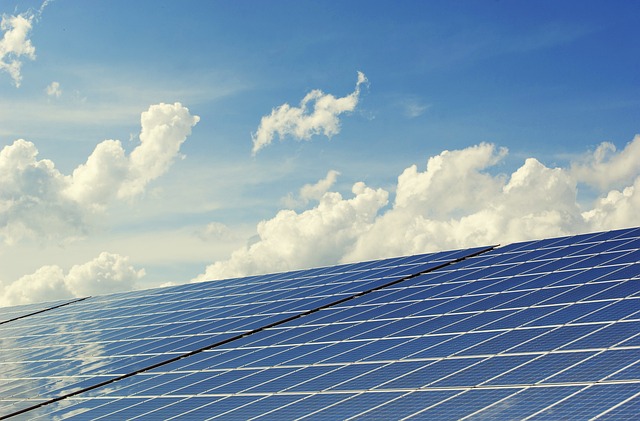Regular maintenance is crucial for maximizing the efficiency and longevity of solar energy systems. Homeowners should routinely inspect and clean their solar panels to remove obstructions that hinder light absorption, using gentle methods to avoid damaging the photovoltaic cells. Seasonal adjustments of the panel angles are necessary to capture the most sunlight throughout the year. Monitoring system performance with real-time tracking tools is essential for identifying deviations from optimal efficiency, which may indicate issues like cell damage or faulty wiring that need professional attention. Regular checks on electrical connections should be conducted to prevent corrosion or loosening that can compromise energy transfer. Utilizing energy management systems and advanced inverters helps prevent operational stress, thereby extending the lifespan of solar panels and ensuring high returns on investment. Additionally, performance monitoring systems provide valuable data for tailored maintenance, enabling adjustments that optimize efficiency, reduce repair costs, and extend system functionality, all contributing to sustained high performance and cost-effectiveness in solar energy installations.
solar energy harnessing is a pivotal component in the transition towards sustainable power sources. To maintain peak performance and longevity of solar panels, diligent maintenance and servicing are non-negotiable. This article delves into best practices for upkeep, from routine inspections to effective cleaning methods, all tailored to enhance solar panel efficiency and extend their operational lifespan. By understanding the intricacies of these processes, users can ensure their solar energy systems consistently operate at optimal levels.
- Maximizing Solar Panel Efficiency: A Step-by-Step Guide to Maintenance and Servicing for Optimal Solar Energy Performance
- The Importance of Routine Inspections, Cleaning Protocols, and Efficient Energy Management in Solar Panel Longevity
Maximizing Solar Panel Efficiency: A Step-by-Step Guide to Maintenance and Servicing for Optimal Solar Energy Performance

Regular maintenance and servicing are pivotal for maintaining high solar panel efficiency and ensuring optimal performance from your solar energy system. To begin, routine inspections should be conducted to identify any debris or accumulation of dirt that may hinder light absorption. This is particularly important in areas with high winds or vegetation that can obscure the panels’ surface. Use soft brushes or non-abrasive cleaning agents to gently clean the panels, avoiding harsh chemicals that could damage the photovoltaic cells. The angle and orientation of your solar panels should be adjusted seasonally to maximize sunlight exposure throughout the year, taking advantage of the sun’s path across the sky as it shifts with the seasons.
Monitoring system performance is another critical aspect of maintenance. Solar energy systems come equipped with monitoring tools that allow for real-time tracking of efficiency levels. Any significant deviations from expected performance should prompt a thorough examination by a qualified professional to diagnose and address potential issues, such as damaged cells or wiring faults. Routine servicing also includes checking electrical connections, ensuring that there is no corrosion or loosening over time, which can affect energy transfer and overall system efficiency. By adhering to a regular maintenance schedule and staying attuned to your system’s performance metrics, you can ensure that your solar panels operate at peak efficiency, providing reliable and sustainable solar energy for years to come.
The Importance of Routine Inspections, Cleaning Protocols, and Efficient Energy Management in Solar Panel Longevity

Regular inspections and meticulous cleaning protocols are indispensable for maintaining the peak performance of solar panels, significantly contributing to their longevity. Solar panels accumulate dirt, dust, bird droppings, and other debris over time, which can reduce their efficiency. Routine inspections allow for early detection and resolution of potential issues, ensuring that each panel operates at optimal capacity. These inspections should include a visual assessment to check for physical damage, corrosion, or signs of wear that could impair the system’s functionality. Moreover, established cleaning schedules tailored to the local environment are crucial for maintaining high energy yields. Harsh climates can accelerate the accumulation of soiling, necessitating more frequent cleaning sessions. Employing appropriate cleaning agents and techniques—such as pure water rinsing where effective—can prevent damage while enhancing performance.
Efficient energy management further extends the lifespan of solar panels by protecting them from operational stress. Advanced inverters and optimizers can regulate energy output, reducing strain during high production periods and ensuring a steady supply of electricity. By integrating these devices into the system, homeowners and businesses can maximize the return on their investment in solar energy over the long term. Additionally, monitoring systems that track real-time performance data enable proactive adjustments to cleaning schedules and maintenance activities. This data-driven approach to managing solar panels not only improves efficiency but also reduces repair costs and extends the functional life of the system, making it a key component in realizing the full potential of solar energy investments.
Regular upkeep and expert servicing are pivotal for maintaining the efficiency of solar panels. By adhering to the detailed maintenance and cleaning protocols outlined in this guide, users can ensure their solar energy systems operate at peak performance, maximizing their investment’s return over time. Consistent inspections play a key role in preemptively addressing potential issues, thereby extending the lifespan of these vital renewable energy components. As the global demand for sustainable power solutions continues to rise, the insights provided here underscore the importance of proactive solar panel management. Investing in routine care is not just about enhancing efficiency; it’s a step towards a more sustainable future powered by clean and reliable solar energy.
